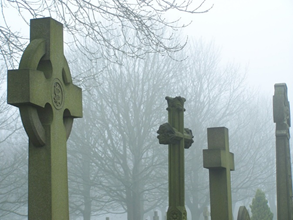
After death, there are many options that families can select for the disposal of the loved one’s remains. The most popular choices are burial in a public cemetery and cremation. More exotic options include cryogenic freezing of the body, burial at sea or even sending a portion of the remains into outer space. What if the deceased wished to rest in peace much closer to home? Did you know that it is legal in Michigan to designate a portion of your private property to be an exclusive burial ground for you, your family and your descendants if certain conditions are met? Did you know that this exclusive burial ground can create an exemption for that section for the purposes of property taxes?
Before creating a family cemetery, you will need approval from the township zoning board and a permit from the local health department. MCL 128.111 lists the following requirements for a private burial ground:
- The private burial ground is for the purpose of interment of the property owners’ families and descendants, and FOR NO OTHER PURPOSE.
- The proposed tract of land to be laid out and surveyed cannot be within the corporate limits of any city and village.
- The private burial ground cannot exceed one acre of land.
- A deed must be recorded with the register of deeds designating a grant of that tract of land forever for the purpose of private family burials (the deed may create a trusteeship to manage the private burial ground at the grantor’s discretion).
The private burial ground has the following protections under MCL 128.112:
- No sale, judgment or decree can be made with the effect of diverting the purpose or object of said grant for private burial ground
- It shall not be taxed for ANY purpose.
- It shall not be subject to any sale for taxes or any execution, attachment, or other order of sale made by any court
- Any deed made by said trustees or their successors, or upon any sale made for taxes, or upon any execution, or decree, or order of sale made by any court of said lands or any part thereof, or any tenements, tombs, or other structures, thereon and appurtenant thereto, shall be void and shall convey no interest or title to the grantee named in such deed.
The General Property Tax Act, Act 206 of 1893 provides that “[l]and used exclusively as burial grounds, the rights of burial, and the tombs and monuments in the land, while reserved and in use for that purpose is exempt from taxation…”. MCL 211.7t. The key language all statutes is “exclusively” and “for no other purpose.” In Berlin v Gaines Township, 130 Mich App 337; 343 NW2d 544 (1982), the Michigan Court of Appeals upheld the Tax Tribunal’s denial of a tax exemption for a private cemetery on nine-tenths of an acre of land containing a farm residence and minor farm buildings. There was no question that the land was being used as a cemetery since there were seven family burials. However, the house on the property was used by a nephew as a residence. The Michigan Court of Appeals determined that the burial ground is either exempt in its entirety or not at all (the taxing authority cannot apportion between the house and the land). Since the nine-tenths of an acre was not being used exclusively and for the sole purpose of a burial ground, the tax exemption was denied.
Although the services of a licensed funeral director are not required to conduct a funeral, state law requires that a funeral director sign the death certificate before it can be filed. MCL 333.2843. In addition, a burial transit permit must be generated either by a licensed funeral director or the county clerk who filed the death certificate in order to transport the body to the place of final burial. Michigan law does not require embalming, a burial vault or even a casket, so the family has substantial discretion on how they wish to conduct the burial. Keep in mind that the private burial ground rules only apply to the burial of intact human bodies and not cremated remains. After a body is cremated, the resulting “ashes” are sterile and do not pose a threat to public health. There are no state laws governing the scattering or disposition of cremated remains. There are no legal restrictions to spreading or burying a person’s ashes on private property.
Before committing to a private burial ground, there are important considerations you should be aware of. First, the property tax exemption for the burial ground is completely dependent on its sole and exclusive use as a cemetery for family members only, so that tract can never be used again for another purpose (including storage buildings). If this is violated, then the tax exemption will be denied in its entirety. Second, the process to obtain a permit from the zoning board and the health department can be expensive and cumbersome. Local ordinances and health department regulations may impose several rules such as a minimum distance of burial plots from existing buildings, so it pays to ensure that legal restrictions do not frustrate your purpose. Finally, the establishment of a private burial land can have a significant effect on the resale value of the land. Prospective buyers may be uncomfortable with dead bodies near the primary residence and frustrated with the perpetual land grant that limits any development. A private burial plot may make more sense for a plot of land intended to be handed down within a family from generation to generation.
If you have questions about private burial grounds or any other issues regarding property law, then do not hesitate to contact the experienced attorneys at Kershaw, Vititoe & Jedinak PLC today.





